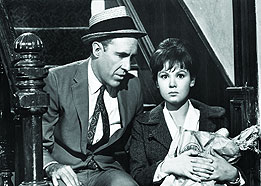"Everybody onstage for the Hawaiian number, please."

If you’re a writer you can trace your particular passion to a handful of other writers who twisted you during your formative years. They gave you an idea of the shapes you wanted to fill and how to bend the words to fill those spaces. Now you stand on their shoulders and in repayment spread your adopted DNA through the gene pool for other writers.
Herb Gardner was sixty-eight-years-old when he, as the papers like to put it, “lost his long fight” with lung cancer in September, 2003. He’d written five produced plays and one produced original screenplay. But if he’d only written that first play he would have done enough to achieve immortality. Forty-five years ago, Herb Gardner wrote A Thousand Clowns. If you do not know A Thousand Clowns, your life is a sad and incomplete thing and I pity you more than I have contempt for your woeful ignorance. Tomorrow rent the 1965 movie version, then we can talk.
For those of you familiar with the piece I need say nothing more than “Everybody on stage for the Hawaiian number!” to evoke the character of Murray Burns, an unemployed television writer who lived in a New York walkup apartment with his eleven-year-old nephew who was named Nick, most of the time.
Murray Burns, who never answered letters from large organizations, who threw open windows to complain to his neighbors about the poor quality of their trash requesting they throw out more champagne bottles and empty caviar tins, who was so witty and so charming women adored him at first encounter, this Murray Burns was my generation’s Peter Pan, Walter Mitty and Don Quixote, only with better material and a stronger sex drive.
In college you took every girl you dated to see A Thousand Clowns as early in the relationship as possible. This was done first to make sure she had a sense of humor, second so that she’d recognize that you were Murray Burns. You were the acerbic ladies man, the connoisseur of ukulele music and old movies, the lover of life who, when asked to return to reality responds, “I’ll only go as a tourist.”
The language in a Herb Gardner play is dense, passionate and funny. It caroms like a table full of billiard balls hit with a lot of English. It’s a place where people talk about looking for work “in downtown Oz.” Where a man notices his father addresses the middle of his chest because that’s where his head was when he was twelve-years-old. It is a place where old vaudeville lyrics are treated with the respect afforded Shakespeare sonnets; where an a capella rendition of Painting the Clouds with Sunshine can crack your heart and a single chorus of Yes, Sir, That’s My Baby can stop a beautiful woman’s tears and woo her into bed within half an hour of meeting her. Where people say things like: “The time, Mister...it’s not a thief like they say; it’s something much sneakier...an embezzler; up nights, juggling the books so you don’t notice anything’s missing.” Where a man remembers his first love with the words: “Ruthie Tresh. Pretty, pretty Ruthie Tresh. Red hair and lime-green sweaters. A candy store of a girl.” Where freedom is a beautiful, dangerous thing that often must be exchanged for something more valuable: Love.
It’s not language that always works dramatically, sometimes it sounds like Groucho Marx reading Ferlingetti, or Chekov performed by the gang from Your Show of Shows. But even when the dramatic context fails to convince you, you can still recognize the it’s the best dialogue you’ve ever heard. You listen to it and you read it and you reverse engineer it to try to learn its secrets.
One of the things you learn is that all Herb Gardner’s characters are battling time, either trying to hang on to a perfect moment or struggling against the tide, fighting to get back or rebuild the place when and where they were happy and things had beauty and color and food still tasted like something when you bit into it. They try to change the game so no one gets lost, no one is alone and no one grows old. It’s impossible. It’s hopeless. It’s tragic. And it’s danced by Ernie Kovacs in a gorilla suit on a stage scattered with banana peels. All of it dedicated to teaching us the lessons Murray wishes to teach Nick: “I want to be sure he knows when he’s chickening out on himself. I want him to get to know exactly the special thing he is or else he won’t notice it when it starts to go. I want him to stay awake and know who the phonies are, I want him to know how to holler and put up an argument, I want a little guts to show before I let him go. I want to be sure he sees all the wild possibilities. I want him to know it’s worth the trouble just to give the world a little goosing when you get the chance. And I want him to know the subtle, sneaky, important reason why he was born a human being and not a chair.”
I stole that last bit about not being a chair and gave it to Daryl Hannah in Attack of the 50 Foot Woman.
Gardner touches my dialogue more than any other writer, including Serling and Sturges. Dialogue is not human speech. It’s something much more potent, more concentrated, that’s been crafted to resemble human speech. We hear it, we copy it and then it becomes the sounds spoken around us on high days and fair days. I learned pace and rhythm from Gardner. And I learned about the poetry of the common place, the beauty of what appears disposable.
I don’t know if I wouldn’t have a career without Herb Gardner, but I know my stuff wouldn’t sound the way it does without him.
Here’s one speech from the third act of A Thousand Clowns. It’s not a funny speech, but it’s one of my favorites. Murray is talking to his brother Arnie who is also his agent and is trying to convince Murray to go back to his old job writing on The Chuckles The Chipmunk Show:
“Oh, Arnie, you don’t understand any more. You got that wide stare people stick in their eyes so nobody’ll know their head’s asleep. You got to be a shuffler, a moaner. You want me to come and sit and eat fruit with you and watch the clock run out. You start to drag and stumble with the rotten weight of all the people who should have been told off, all the things you should have said, all the specifications that aren’t yours. The only thing you got left to reject is your food in a restaurant if they do it wrong and you can send it back and make a big fuss with the waiter. Arnold, five months ago I forgot what day it was. I’m on the subway on my way to work and I didn’t know what day it was and it scared the hell out of me. I was sitting in the express looking out the window same as every morning watching the local stops go by in the dark with an empty head and my arms folded, not feeling great and not feeling rotten, just not feeling, and for a minute I couldn’t remember, I didn’t know, unless I really concentrated, whether it was a Tuesday or a Thursday...or a...for a minute it could have been any day, Arnie...sitting in the train going through any day...in the dark through any year...Arnie, it scared the hell out of me. You got to know what day it is. You got to know what’s the name of the game and what the rules are with nobody else telling you. You have to own your days and name them, each one of them, every one of them, or else the years go right by and none of them belong to you. And that ain’t just for weekends, kiddo.”
So many of the writers who made me a writer are dead now. This makes the act of writing, which is always a solitary pursuit for me, a little lonelier. But sometimes in that loneliness a line comes to me unbidden, like a mantra sent to help me. “Ruthie Tresh,” it whispers. “Pretty, pretty, Ruthie Tresh. Red hair and lime-green sweaters. A candy store of a girl.”
And then I write some more.

December 28, 1934 - September 23, 2003



0 Comments:
Post a Comment
<< Home